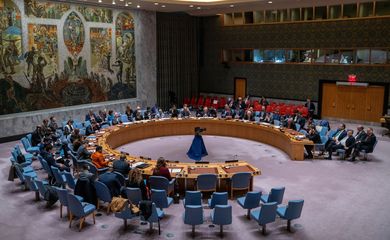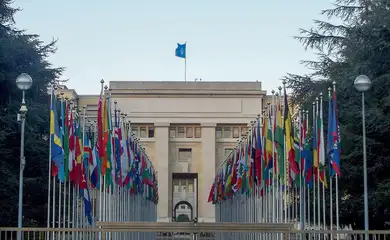Brazil criticizes UN Security Council impasse: "We failed"

Brazil's representative on the United Nations Security Council, Foreign Minister Mauro Vieira, strongly criticized the council's delay in approving a resolution regarding the conflict between Israel and the Islamic group Hamas, which controls the Gaza Strip in the Middle East. During a meeting held on Monday afternoon (Oct. 30), Vieira voiced his concerns about the positions of certain countries, which, according to him, are using the council to pursue personal objectives rather than prioritizing the protection of civilians in the Middle East.

"Since October 7, we have convened multiple times and voted on four resolutions. Yet, we remain deadlocked due to internal disagreements, particularly among the permanent members, and the persistent use of the council for personal interests rather than prioritizing the protection of civilians," he expressed. "Our inability to unite and respond to this challenging crisis is evident to everyone," he added.
While chairing the council in October, Brazil made several attempts to pass a resolution, listening to various countries. However, on October 18, when the text was put to a vote, it was vetoed by the United States, one of the permanent members.
The UN Security Council consists of five permanent members: China, France, Russia, the United Kingdom, and the United States. The remaining members rotate. To pass a resolution, it requires the support of nine out of the total 15 members, and none of the permanent members can veto the text. In addition to Brazil's proposal, the United States presented its version of the resolution, which was vetoed by Russia. The Russians, in turn, had their two proposals vetoed by the United States and the United Kingdom.
Vieira's criticisms were fueled by the various unsuccessful attempts to establish a common position. While presiding over the meeting, he followed President Lula's guidance, apologizing to his colleagues before addressing them as the Brazilian Chancellor.
"Since the last time I spoke to this council, last week, the number of child casualties has risen by a thousand. Meanwhile, the Security Council convenes meetings and listens to speeches without making a fundamental decision to end human suffering," he pointed out. He highlighted that the council has consistently failed to prioritize the lives of civilians.
"While thousands of Israelis and Palestinians mourn their loved ones and Israelis agonize about the fate of the hostages, and Gaza suffers a relentless military operation that claims civilian lives, including an intolerable number of children, we have the means to take action, yet we repeatedly fail."
In a direct and critical speech, Vieira also called for an end to hostilities and access to medical care for civilian victims in the Gaza Strip. He pointed out that, in three weeks of conflict, there have already been 8,000 deaths, 3,000 of them children. At one point in his speech, the foreign minister cited Hamas as responsible for rekindling the crisis in the region with "terrorist actions."
He added that there may still be time for the Security Council to take a stand on behalf of civilians and against hostilities in the region. "If not now, when? How many more lives will be lost before we finally move from rhetoric to action?" he concluded.
Diverging views
In recent weeks, the council has witnessed a dispute between the United States and Russia over the leading role in the discourse. While the Americans, supported by the United Kingdom, demand a resolution guaranteeing Israel, their ally, the right to respond to the attacks it has suffered, Russia proposes a ceasefire, but does not mention Hamas.
The Russians also do not condemn the Islamist group for the actions that initiated the latest chapter in the long-standing conflict in the region.
Both the United States and Russia possess veto power, thus continuously opposing each other's supported resolutions. In Brazil's presented resolution, which was more likely to be approved, Russia abstained, leaving it up to the United States to overturn the text.






